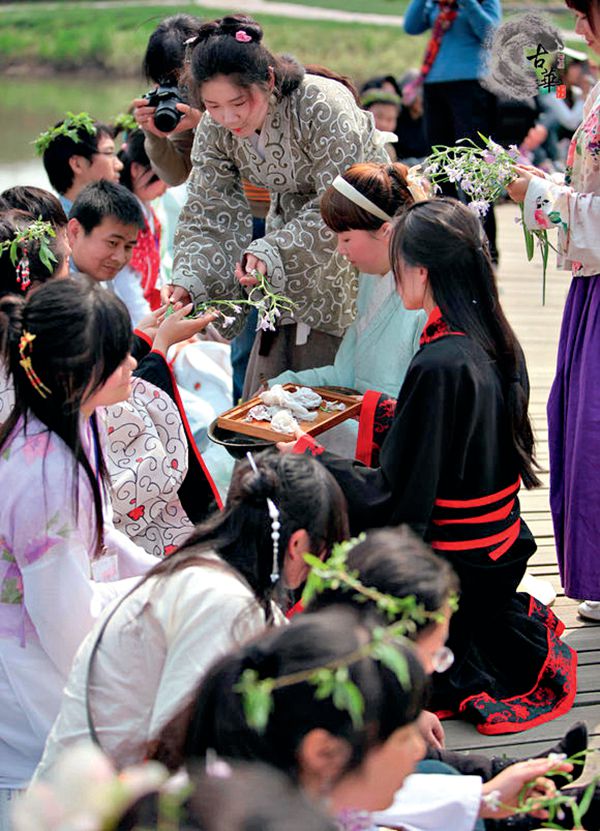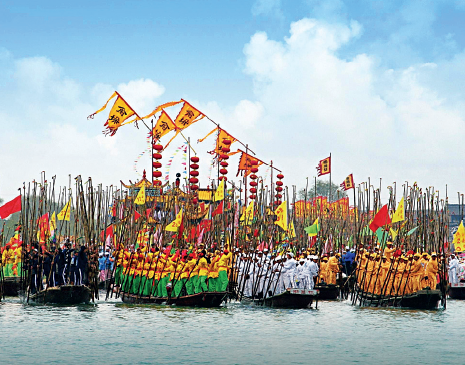Traditions in Different Regions
Cold Food in Jiexiu
Jiexiu in central Shanxi Province is regarded as the cradle of the Qingming Festival. Folk customs during this festival have been well preserved to this day. In 2011, Cold Food in Jiexiu was included in the National Intangible Cultural Heritage inventory.

In the Spring and Autumn Period, Jie Zitui, a senior official in the State of Jin, remained loyal to the exiled prince Chong’er for over 19 years. Having gone through all manner of hardship, the prince eventually returned to his kingdom and ascended the throne. He began to reward those who had rendered him outstanding service on his journey to the throne, but Jie Zitui was not among them. Not one to jostle for merit and reward, Jie had resigned and lived in seclusion with his mother on Mianshan Mountain in Jiexiu. Later, Chong’er regretted this injustice to Jie and traveled to the mountain in the hope of meeting him. However, his request was in vain. In desperation, Chong’er ordered the surrounds burned down, in an attempt to force Jie out. With a determined heart, Jie burnt to death under a willow tree. Chong’er was filled with remorse. The following year, when he went up to the mountain to commemorate Jie, he saw a willow tree blooming with green branches and leaves. He placed a twig on his head and named the tree “The Qingming Willow.” In memory of Jie, he forbade the use of fire across the state on every anniversary of Jie Zitui’s death, and required that all food be consumed cold.
Today, various traditional rituals are still carried out in Jiexiu to celebrate the Cold Food and Qingming festivals, including, observing rituals, sweeping tombs, wearing circlets of entwined willow twigs, watching cock fights, putting willow twigs on gates, going on outings, and holding poetry readings. Locals also make dough figures, clean their roofs and perform folk operas on this occasion. Moreover, a good variety of food is served, including steamed cakes in different shapes named after Jie Zitui, steamed paste buns resembling rabbits (symbolizing Jie Zitui) intertwined with snakes (symbolizing Jie’s loving mother), date-stuffed cakes, and sesame seed candy, to name a few.
Qintong Boats Gathering
With a history of nearly 1,000 years, the Qintong Boats Gathering is a popular folk tradition in the ancient town of Qintong in Taizhou, Jiangsu Province. It is also known as the Qingming Grand Gathering.

Though different versions about the origins of this event may be heard, they are all aimed at commemorating soldiers who sacrificed themselves for their homeland. Orginally, local people voluntarily punted their boats as a memorial ceremony for martyrs. As time passed, it became traditional for large numbers of boats to gather on the day after the Qingming Festival. The event is usually held in the region between the Lihe River and the Xiahe River in central Jiangsu, covering hundreds of square kilometers.
Ten days before the Qingming Festival, flags are raised in the villages about to join the gathering, signifying the onset of boat selection. The chief organizers in each village, usually local administrators, are responsible for safety. Owners of new, lightweight boats are most likely to be the honored selectees. Participants then practice for days and both clean and decorate their boats.
On the big day, boats gather in the competition area after the ritual offerings ceremony held at dawn. The sounds of gongs, drums and waves resound as beautifully decorated boats move to the starting line on the lake. The boat race, the main part of the grand gathering, is always exciting. Competing in pairs, participating boats set off like flying arrows. The beating of gongs and drums gets faster and faster as the competitors go at full speed towards the finishing line, as villagers cheer on the banks – it is a day to rejoice.
The boat race is often followed by folk opera performances and drinking parties. At wine parties, it is a tradition for the leading boatman of each boat to give his pole to a childless couple, to wish them sons in the next year. The couples then set off firecrackers to welcome the poles and thank the boatmen with tea and candies. If their dream comes true, the couple buys a new pole for each of the boatmen. Some may also invite them to a celebratory banquet.
The Qintong Boats Gathering showcases people’s wishes for a prosperous country and a peaceful and affluent life. The formalities of this event have been passed down for centuries. To this day, it is the best-conserved and most ancient water festival in China. It was listed as a National Intangible Cultural Heritage in 2008.
Compiled and edited by China Today.
